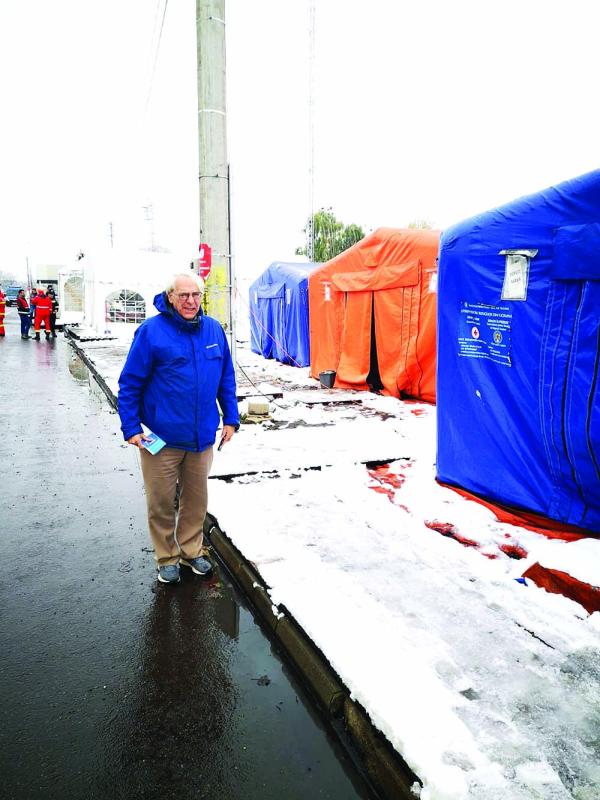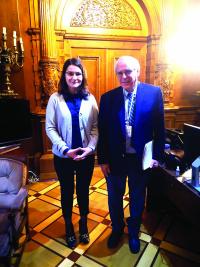December 8, 2022

Above, the author at Radauti in Romania near the Ukrainian border. Photos supplied by Lew Finfer

Two weeks ago, on Nov. 22, I found myself at a border crossing checkpoint in the small Romanian city of Radauti, where some 800,000 refugees from nearby Ukraine, mainly women and children, have sought refuge from Vladimir Putin’s onslaught. There were already several inches of snow on the ground as winter took hold.
Why was I there? For the last eight years, our Dorchester-based organization, MA Communities Action Network, has participated in the US State Department-sponsored Professional Fellows program, which brings Eastern Europeans from Romania, Hungary, Slovakia, Bulgaria, and Albania to the United States for one-month internships in partnership American community organizing groups.
My family and several other Dorchester residents have hosted 16 fellows over the years. My neighbors — including Beverly Rock, Betsy Drinan, Don and Holly Walsh, Doreen Treacy, Nancy Anderson, Sydney Hanlon, Diane Gantman and Bob Weiss, Judith and Brook Baker, and Joyce Linehan— have also hosted the Europeans. The program also allows someone from the hosting organizations to visit the Fellows in their country to give them additional support and learn more about their organizations. So that’s why I was in Romania and Hungary.
In Romania, I was on the ground seeing the work of Civic Radauti, an organization that has stepped up to help Ukraine in remarkable ways. They have rented a warehouse and arranged for donations of food and supplies from different parts of Europe. They have shipped 800 tons of supplies to Ukraine on 157 different transports helping 45,000 people over the last 7 months. They also have had people at the border since the second day of the war to greet the refugees and connect them to food, transportation, and housing.
Tens of thousands of Ukrainians are housed in homes in Romania, and millions more all have found refuge across Europe. There was no housing available for about 100 women and children at the border near Radauti, so they are in a refugee camp, living in trailers and eating in big tents. Melting snow has caused deep mud outside the trailers, so the Civic Radauti volunteers brought over 15 wooden pallets to create paths from their trailers over the mud.
Luca Ciubotaru, who was one of those Fellows who came to Dorchester, is one of the organizers. Right now, they are renovating a vacant building as a community center for the displaced Ukrainians. In the neighboring village of Bilka, they’ve built a Friendship Park with a soccer field, volleyball court, children’s playground, and barbecue. They also campaigned and got their City Council to put their meetings on Zoom to increase transparency and accountability. And they have plans to expand their work to other villages.
In Hungary, I met with another Fellow who had been in Dorchester, Vivien Brassoi. She is director of Litigation for the European Roma Rights Center. There are about 12 million Roma in European countries living in poverty and suffering intense discrimination in education, employment, housing, and health care. Roma children are in separate classrooms in schools they go to; separate and not equal.
Vivien’s group sues governments in 23 European countries for different discriminatory practices against Roma people. They often lose in court and have to appeal to the European Court of Human Rights. Said Vivien’s boyfriend Andris: “Whenever Vivien leaves for the Post Office with a big set of parcels, I wonder which country she is suing now.”
Many of the “Dorchester Fellows” are doing important work. There’s Sylvia Vrinceanu Nichita, who bring books to poor children in isolated rural villages in Romania. Madalina Marcu has organized a set of local foundations across Romania and just recently formed a coalition of Romanian civil society groups. Zsuzsanna Gutjahr helps manage 5,000 public housing units and commercial spaces in her neighborhood of Budapest. Szabrina Abdullah Magdi is organizing a civil platform with chapters on social issues across Hungary.
Hungary is led by Victor Orban, an autocrat whose Fidesz Party, aided by gerrymandering, holds a super majority in Parliament. They control government TV stations that put out propaganda continually. They have pressured other TV stations and media to sell to Orban supporters. His party plastered Hungary with posters accusing Hungarian philanthropist and businessman George Soros of trying to run the country and open the borders to tens of thousands of non-Christian immigrants. They doctor photos of Soros to give him a big hooked nose: a clear anti-Semitic smear.
Orban is the only European Union member country giving support to Putin. Hungary gets massive aid annually from the European Union. For years, Orban’s regime hasn’t lived up to EU standards for democracy. It is finally withholding some of this aid, and Orban has retaliated by holding up a European Union multi-billion dollar aid package to Ukraine. He is the darling of the US Republican Party and of Fox News commentator Tucker Carlson.
While visiting, we attended a rally of 3,000 in the small city of Pecs that was involved in a nationwide teachers strike (Hungary’s teachers are the lowest paid in Europe). I also attended a Reunion Conference of people who have been in this Professional Fellows program. There are more than 300 people from the 5 countries working to build a stronger civil society in their communities. In my first visit 8 years ago, I was told, “you can make a revolution to overthrow communism in 3 days, change your economy in 6 months, but it takes a generation to build a civil society.” One, that is, featuring social service agencies, community groups, independent labor unions, and a democratic government.
Thanks to the people in this program, I was able to find my relative Gyorgi Florek in Budapest. Almost all Jews in Hungary were killed in the Holocaust of World War II by the Nazis, who were aided by Hungarian collaborators. That multitude included some of my relatives, so it was a miracle to be reunited with Gyorgi and his family. I also visited my great uncle and great aunt’s grave in a greatly overgrown cemetery and cleared the brush around it. I also placed a plant above the grave.
I’m grateful to have had this chance to meet dedicated people from these countries and learn about their culture, politics, and challenges.
Lew Finfer is a Dorchester resident and community organizer with MA Communities Action Network.



